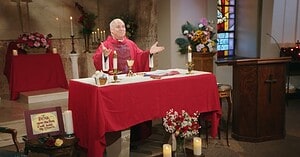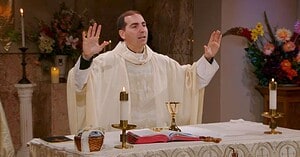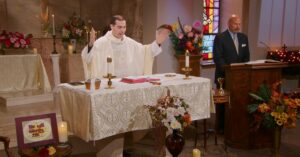Nativity of the Lord
Homily Video
Nativity of the Lord Homily Transcript
Again, my warmest greetings to all of you on this Christmas celebration. And especially to all of those who are watching in their homes or maybe from their sick beds in hospitals and other homes that are caring for them. We in a special way pray for you in this mass and for your intentions. In many ways it’s an opportunity for me to be close to those who are home bound, those who are ill, those who have a difficult time coming out during the Winter months.
Recently, earlier in the month, the Holy Father asked me to go to Puerto Rico, to visit the people there who suffered great tragedies from a number of hurricanes that were in many ways, so devastating to property and homes, the economy. People were suffering a great deal and so he said to me that he would like me to go to let them know that he’s close to them, even though he could not come, he asked me to go to be his presence among them.
In many ways, I felt great responsibility doing this because he really entrusted with me an important mission to represent him, to let people know of his care and concern. So I decided to take my time, four days, before Christmas and because he said he wanted me to go before Christmas, to go to all of the different towns and villages around the entire island where I saw people.
But what was so interesting in all of that was when I came to those places, people even though many of them were suffering, many of them don’t have electricity or even running water, were so very resilient. There was something within them that allowed them to see life differently. Not only were they resourceful and resilient but they were joyful, and also very generous to one another.
In so many ways, I felt as thought I had anticipated the celebration of Christmas and the meaning of Christmas. Something that we see here and the visitation of the shepherds that go to the stable. Something happened to them. Not only were they coming to bring good news but something had to happen to them, just as it did to me, as I went from village to village. I came away knowing that I had received much more than I gave.
So let’s look at these shepherds. What is it that they’re calling us to imitate on this Christmas feast? How do we see the world differently through their eyes? The important thing to
see is first of all, that leaving the fields and their sheep behind, meant that they had to move out of their comfort zone, the place where they lived, and to go into town. Shepherds were not towns people. They lived on the periphery. They were in the countryside, they liked the open air, not the confines of a gated city. So they remind us that this feast is about maybe making sure that we’re not living just on the edge of society or maybe sitting by the roadside and letting life go by.
But the Lord is asking us to really participate in the life of the church, in the life of society. To take our place. Not to allow life just to go by, but to really be a part of what’s going on.
But it’s also reminder for all of us who are involved in the life of the church to make sure that we make room for people who feel as though they’re excluded. Who live on the peripheries, maybe who have been alienated from the church, and that is precisely what we’re trying to do in the archdiocese with renew my church. We’re trying to set the stage for people to feel at home, in the life of the church, to feel as though this is a place in which their life is going to be nourished and that their lives count.
Those shepherds encourage us to have that kind of vision. Not only that we ourselves are going to move out of our comfort zones to participate in the life of the church, the life of God’s people, but also that we’re going to make room because when they came to that stable, they obviously felt welcome. They obviously felt that this was a place they could feel at home, and found hospitality in the holy family.
We see that secondly because they were willing to share their story. There’s nothing more intimate than the kind of conversation in which you share your story with somebody else. When you let them know why your faith matters like something to you. Why it is important to you. Or where God has been present in your life. That is a very intimate conversation to have. Yet, it is one that takes place when you feel secure in an environment to do that.
So the shepherds, they also remind us not to be afraid to share our stories. I said, on the day of my insulation as the arch bishop, that it’s important for especially grandparents, to let their grandchildren know why they are Catholic. Why the belief in Jesus Christ is important to them. How it transformed their lives. That’s an intimate conversation. It’s an important conversation. But it has to be wrapped in to one’s own story about how God has been present to you. So the shepherds today remind us not to be afraid to share our story. Some of the fear we have about sharing our story is that they’re really not that important. They really don’t count.
I can tell you in a humorous way, I have five sisters and when they came for my insulation and they saw all the news in the newspaper and on the TV about me, one of my sisters pulled me aside and said, I don’t get it. You’re not that interesting. Sometimes we don’t think that our lives are very interesting, but they are. The story of how God has intersected in our life, that’s what the shepherds do. They not only say what the angels told them, they also tell about how it made a difference in their life. How it compelled them to come, racing down in haste, from the hillside into Bethlehem, to tell their story. So the shepherds today, tell us to have the courage to be in touch with our story, and to be willing to share it.
Renew my church is about that as well. It’s about how we make disciples, how we rebuild our church, and how we inspire witness, inspiring witness to tell our story. And the final thing that we see about the shepherds is this is the first glimpse that we have about Mary’s role in the life of the church. We are told that she treasured what she heard, what those shepherds told her, or their story, she treasured it in her heart. That really is one of the main roles of Mary. She’s quiet, she’s silent, she doesn’t speak a lot, but she listens. She’s a receptacle, she’s the one that holds like treasure what we have to say. So the shepherds remind us that we have a special relationship with Mary in the life of the church. It’s important for each one of us, especially when we don’t think that our lives are very important, or when we suffer silently, to bring that to Mary. When we do so, we’re reminded that it will never be lost. That story, even though it’s maybe not told on our lips, will always be treasured by Mary, for all eternity.
That’s an important role of Mary. She’s that treasure chest. She holds in trust our lives. That’s why she’s so important to the life of a Catholic. We go to her in our need, not just because we want her to help us in our need and our difficulties, but we trust that we’re going to get a hearing and that she will remember our lives, and she knows us. So the shepherds today, tell us that it’s an opportunity for us to move out of our comfort zone, to see Christmas as a day in which we start again. We go in haste, in order to play our part in the good of the church. That we’re willing to tell our stories because we believe that God is working there, even though people say we’re not that interesting.
And finally, to be able to sustain our understanding of how our lives are important, by always sharing them with Mary, our mother. Trusting that she won’t forget anything. That she’ll always treasure our lives in her heart.
Readings
First Reading:
Isaiah 52:7-10
Second Reading:
Hebrews 1:1-6
Gospel:
John 1:1-18 or 1:1-5, 9-14
Featured Text
A special thank you this week to our friends from the Mercy Home Board Members and Friends in the congregation.
Discover More
Saints Peter and Paul, Apostles
June 29, 2025
The Most Holy Body and Blood of Christ
June 22, 2025
The Most Holy Trinity
June 15, 2025
Request Sunday Mass Guide
The Sunday Mass Guide sent to your home address
Spiritual nourishment and updates from the Sunday Mass community
Monthly reflections from Fr. Scott Donahue, our Principal Celebrant


